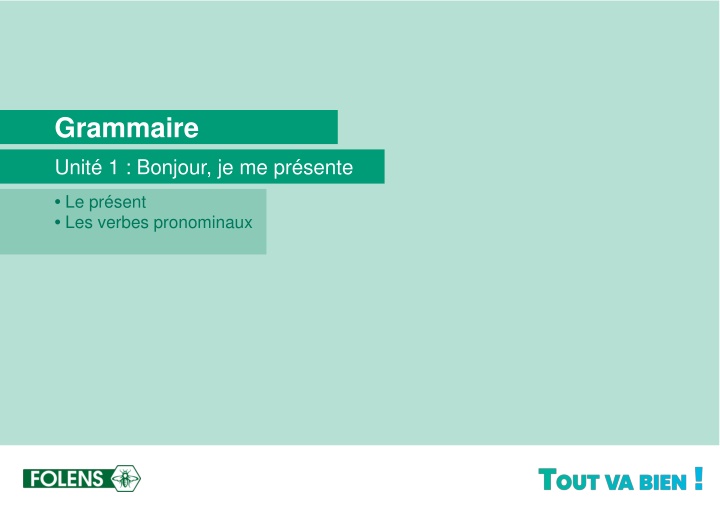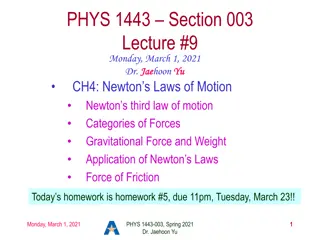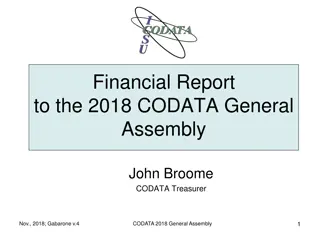
French Present Tense: Formation and Usage of Regular Verbs
Learn about the French present tense, focusing on the formation and usage of regular verbs. Discover how to conjugate regular verbs ending in -er, -ir, and -re, and practice with examples. Mastering the present tense is essential for effective communication in French.
Download Presentation

Please find below an Image/Link to download the presentation.
The content on the website is provided AS IS for your information and personal use only. It may not be sold, licensed, or shared on other websites without obtaining consent from the author. If you encounter any issues during the download, it is possible that the publisher has removed the file from their server.
You are allowed to download the files provided on this website for personal or commercial use, subject to the condition that they are used lawfully. All files are the property of their respective owners.
The content on the website is provided AS IS for your information and personal use only. It may not be sold, licensed, or shared on other websites without obtaining consent from the author.
E N D
Presentation Transcript
Grammaire Unit 1 : Bonjour, je me pr sente Le pr sent Les verbes pronominaux
Le prsent 1. Knowledge base In English, you are used to two forms of the present tense, e.g. to sing: She is singing (right now) She sings (every day, in general) In French, there is one form only, used to communicate current or habitual actions: Elle chante 2. Motivation The present tense is the most difficult tense in French, because of irregular verbs, but we will build it up gradually! The good news: 90% of French verbs are regular! The better your knowledge of verbs, the easier it will become for you to communicate successfully in French! 2
Le prsent 3. Formation of regular verbs The majority of French verbs are regular. There are three verb families, ending in -er, -ir or -re. When we first learn a verb, we do so in the infinitive form, e.g. donner (to give). An infinitive is made up of two parts: a stem and an ending: Donn + er To form the present tense of regular verbs, we remove the ending of the infinitive and add the appropriate ending to the stem: Donn er 3
Le prsent 3. Formation of regular verbs Donner (to give) Finir (to finish) Vendre (to sell) donne donnes donne donnons donnez finis finis finit vends vends vend je/j tu il/elle/on nous vous finissons finissez vendons vendez ils/elles donnent finissent vendent 4
Le prsent 4. In pairs, think of at least three regular -ir and -re verbs grandir attendre choisir vendre rougir entendre (about 300 French verbs!) (several dozen French verbs!) 5
Le prsent 5. Other commonly used regular -ir and -re verbs in French accomplir agir agrandir avertir b tir blanchir d finir tablir grossir gu rir investir maigrir nourrir ob ir punir r fl chir to accomplish to act to enlarge to warn to build to whiten to define to establish to put on weight to cure, to heal to invest to lose weight to feed to obey to punish to reflect, to think to confuse confondre correspondre to correspond d fendre d pendre descendre tendre fondre mordre perdre pr tendre rendre r pandre r pondre suspendre tordre to defend to depend to descend to stretch to melt to bite to lose to claim to give back, to return to scatter to answer to suspend to twist 6
Le prsent 6. Complete the story using the correct form of the verb No a 17 ans. Il va au Lyc e Bordeaux. Il ___________ (travailler) beaucoup ! midi, lui et sa copine Irina ___________ (manger) la cantine. Il y a des frites au menu : ils ___________ (remplir) leurs assiettes. Ils ___________ (bavarder). No ___________ (finir) les cours 16h aujourd hui. Il ___________ (attendre) la sortie avec impatience car c est vendredi et il va tout de suite en ville avec des amis apr s les cours. Irina ___________ (r fl chir) encore ce qu elle fera ce soir. No lui propose de venir avec lui, mais elle ___________ (r pondre) qu elle pr f re le voir samedi. Elle ___________ (choisir) plut t d aller en bo te avec ses amies Sophia et Anna ce soir, car elle ___________ (danser). Rewrite the above story in the first person singular and first person plural, e.g. J ai 17 ans. Je vais nous mangeons la cantine, etc. 7
Le prsent 7. Irregular verbs Irregular verbs do not follow a set pattern and must be learned individually. Can you name a few irregular verbs? The following tables list the most commonly used irregular verbs you will need to know. tre (to be) suis es est sommes tes sont Avoir (to have) ai as a avons avez ont Aller (to go) vais vas va allons allez vont Faire (to make/do) fais fais fait faisons faites font je/j tu il/elle/on nous vous ils/elles 8
Le prsent 7. Irregular verbs What do you notice when you look at the first and second person plural of most of these irregular verbs? Most of them revert to a regular pattern. Do you notice other similarities between some verbs? Avoir and aller follow similar patterns, as do pouvoir and vouloir. Devoir (to have to) dois dois doit devons devez doivent Sortir (to leave) sors sors sort sortons sortez sortent Pouvoir (to be able to) peux peux peut pouvons pouvez peuvent Vouloir (to want) veux veux veut voulons voulez veulent je/j tu il/elle/on nous vous ils/elles 9
Le prsent 8. Other commonly used irregular verbs in French to drink to conclude to drive, to lead to know to run to believe to say, to tell to sleep to write to be necessary to fry to include to join to read to put to be born to open to paint to please to rain to take to receive to laugh to know to go out to be enough to follow to hold to be worth to come to live to see boire conclure conduire conna tre courir croire dire dormir crire falloir frire inclure joindre lire mettre na tre ouvrir peindre plaire pleuvoir prendre recevoir rire savoir sortir suffire suivre tenir valoir venir vivre voir 10
Le prsent 9. Complete the sentences with the correct form of the present tense 1. No ___________ (sortir) souvent le week-end. 2. Irina ___________ (savoir) jouer aux checs. 3. Ils ___________ (vivre) Bordeaux. 4. Nous ___________ (aller) en bo te de nuit ce soir. 5. Tu ___________ (pouvoir) m aider avec les devoirs de physique ? 6. Je ___________ (faire) du tennis tous les samedis. 7. Comment est-ce qu on ___________ (dire) to laugh en fran ais ? 8. Regarde Adrien : il ___________ (dormir) debout ! 9. Je ___________ (devoir) terminer ma dissertation avant de sortir. 10.Est-ce que vous ___________ (aller) au cin ma ? 11
Le prsent 10. Les verbes pronominaux (reflexive verbs) In English, reflexive pronouns can sometimes be used when the subject performs the action on itself: to wash oneself I need to wash myself This is much more common in French. Verbs using this extra reflexive pronoun are called reflexive verbs. One difference is that in French the pronoun appears before the verb. French English se laver to wash oneself Reflexive pronoun used in French and English Reflexive pronoun used in French and implied in English se r veiller to wake up 12
Le prsent 10. Les verbes pronominaux (reflexive verbs) The reflexive pronouns are me, te, se, nous, vous and se. Note that me, te and se become m , t and s in front of a vowel. It can sound strange initially, but the nous and vous really are doubled. The good news is that most reflexive verbs end in -er and follow the same pattern as regular -er verbs. Se laver (to wash oneself) S amuser (to enjoy oneself) je me lave tu te laves il/elle/on se lave nous nous lavons vous vous lavez ils/elles se lavent je m amuse tu t amuses il/elle/on s amuse nous nous amusons vous vous amusez ils/elles s amusent 13
Le prsent 10. Les verbes pronominaux (reflexive verbs) To make a reflexive verb negative, we put the ne before the reflexive pronoun and the pas after the verb. ex. : Je ne me repose pas beaucoup ici. Other commonly used reflexive verbs in French: to call oneself to draw near to stop to bathe to go to bed to wonder to hurry up to get angry to get dressed to wash oneself to get up to go for a walk to shave to rest to wake up s habiller se laver se lever se promener se raser se reposer se r veiller se souvenir de to remember s appeler s approcher s arr ter se baigner se coucher se demander se d p cher se f cher 14
Le prsent 11. Complete the sentences with the correct form of the reflexive verbs 1. Depuis qu ils sont arriv s en Corse, Mike et Laura ___________ (se baigner) tous les jours. La mer est chaude ! 2. Je ___________ (se demander) o est Suzie, on doit d jeuner ensemble. 3. Les jumeaux ___________ (s appeler) No et Zo . 4. Nous ___________ (se r veiller) tous les jours 8h. 5. Vous _________________ (se souvenir de) Juliette ? Elle habite Tahiti maintenant ! Reuse the reflexive verbs above in new, simple sentences, making them negative, e.g. Mais Paul ne se baigne pas. Or: Mais nous ne nous baignons pas en Irlande. 15
Le prsent 12. Verbs with spelling irregularities Several verbs in French have slight spelling irregularities. They undergo a small spelling change to the stem, not to the ending, depending on which subject pronoun is used. This happens for pronunciation reasons. For verbs ending in -eter and -eler, double the final consonant before the silent endings. The / / of the infinitive is pronounced / / before the double consonant. Jeter (to throw) S appeler (to call oneself) jette jettes m appelle t appelles s appelle nous appelons vous appelez s appellent je/j tu il/elle/on jette nous vous ils/elles jetons jetez jettent 16
Le prsent 12. Verbs with spelling irregularities For verbs with an -e / /(or - /e/) before the last syllable of the infinitive, change the vowel to - / / before the silent endings. Se lever (to get up) Esp rer (to hope) me l ve te l ves se l ve nous levons vous levez se l vent esp re esp res esp re esp rons esp rez esp rent je/j tu il/elle/on nous vous ils/elles 17
Le prsent 12. Verbs with spelling irregularities For verbs ending in -oyer and -uyer, change the -y to -i before the silent endings. This change is optional for verbs ending in -ayer. Nettoyer (to clean) Essuyer (to wipe) nettoie nettoies nettoie nettoyons nettoyez nettoient essuie essuies essuie essuyons essuyez essuient je/j tu il/elle/on nous vous ils/elles 18
Le prsent 12. Verbs with spelling irregularities Verbs ending in -ger have a spelling change before the hard vowels -a and -o. Add an -e after the g. Verbs ending in -cer have a spelling change before the hard vowels -a and -o. Change the -c to - . Manger (to eat) Commencer (to begin) mange manges mange mangeons mangez mangent commence commences commence commen ons commencez commencent je/j tu il/elle/on nous vous ils/elles 19
Le prsent 13. Complete the sentences with the correct form of the present tense 1. Samir est tr s colo : il ne ___________ (jeter) presque rien. Il ___________ (pr f rer) recycler. Anouk et Samia sont comme lui. Quand elles ___________ (acheter) de nouveaux v tements, elles vont dans des boutiques d occasion. 2. Nous aussi nous ___________ (faire) des efforts pour la plan te. Nous ____________ (nettoyer) la maison uniquement avec des produits d entretien cologiques. Nous ___________ (manger) bio aussi, m me si c est plus cher. 3. Et toi ? Est-ce que tu ___________ (essayer) de faire des gestes pour l environnement ? Oui, je m ___________ (inqui ter) pour notre avenir. Moi et ma s ur Cynthia _______________ (voyager) le plus possible en train et en bateau. En plus, j conomise l eau : je ___________ (rappeler) constamment tous mes amis qu il faut fermer les robinets quand on se brosse les dents, ou qu on se savonne les mains par exemple. 20






















